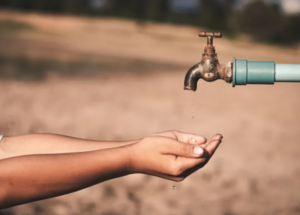Water, the elixir of life, is a resource many of us take for granted. However, in Africa, the scarcity of this precious liquid is an urgent issue that affects millions. As we delve into the intricate web of Africa’s water scarcity problem, we’ll explore innovative solutions that promise to transform the continent’s water landscape.

The Reality of Water Scarcity in Africa
Before we dive into solutions, let’s grasp the scale of the challenge. Africa is home to 17% of the world’s population but possesses only 9% of its renewable freshwater resources. Water scarcity in Africa isn’t just a matter of inconvenience; it’s a matter of life and death.
Rural communities often bear the brunt, with women and children traveling long distances daily to fetch water, leaving little time for education or economic activities. In urban areas, unreliable access to clean water leads to waterborne diseases and hinders economic growth. It’s a crisis that demands innovative solutions.
Harnessing Rainwater Harvesting
One promising solution is rainwater harvesting. Africa receives abundant rainfall in many regions, but a significant portion goes to waste. Innovative systems, such as rooftop rainwater harvesting, are being implemented to capture, store, and utilize rainwater efficiently.
These systems can provide a sustainable source of water for households, schools, and communities, reducing dependence on erratic water supplies and groundwater depletion. With proper filtration and storage, rainwater can be a safe and reliable source for drinking and irrigation.
Solar-Powered Water Pumping
In remote areas where electricity is scarce, solar-powered water pumps are a game-changer. These pumps use the abundant African sunshine to lift water from deep wells or boreholes, providing clean and accessible water to communities.
Solar-powered pumping not only addresses water scarcity but also reduces the physical burden of manual water retrieval, particularly for women and children. It’s a sustainable solution that relies on renewable energy and empowers communities to take control of their water supply.
Desalination Technology for Coastal Regions
Africa is blessed with an extensive coastline, and for coastal regions facing water scarcity, desalination technology offers a lifeline. Innovative desalination plants use reverse osmosis and other advanced methods to convert seawater into fresh drinking water.
While desalination can be energy-intensive, innovations in energy-efficient desalination technology are making it a viable solution for coastal communities. With careful planning and environmental considerations, desalination can alleviate water scarcity for millions living near the coast.
Wastewater Recycling and Treatment
In many African cities, untreated wastewater flows into rivers and lakes, contaminating water sources and exacerbating water scarcity. Innovative wastewater recycling and treatment systems are being developed to reduce pollution and recycle water for various purposes.
These systems not only help conserve water but also contribute to reducing the spread of waterborne diseases. They can be integrated into urban infrastructure to create a closed-loop water supply, benefiting both the environment and the community.
Community-Led Water Management
Community involvement is a cornerstone of sustainable water solutions. Many innovative projects in Africa empower local communities to manage and maintain their water sources, reducing water scarcity and ensuring long-term sustainability.
By providing training and resources, these initiatives enable communities to repair and manage water infrastructure, promote water conservation practices, and take ownership of their water supply. This bottom-up approach fosters self-reliance and resilience in the face of water scarcity.
Mobile Technology for Water Access
In the digital age, mobile technology is playing a significant role in addressing water scarcity. Mobile apps and SMS services are being used to monitor water quality, track water levels in reservoirs, and report water-related issues in real time.
These innovations help authorities and communities make informed decisions about water management and distribution. They also empower individuals to access accurate information about the availability and safety of water sources.
Sustainable Agriculture and Water Efficiency
Agriculture accounts for a substantial portion of water consumption in Africa. Sustainable farming practices, such as drip irrigation, precision agriculture, and drought-resistant crop varieties, are helping farmers maximize crop yields while using less water.
Efforts are also underway to promote water-efficient farming techniques and educate farmers about the importance of water conservation. By optimizing water use in agriculture, we can mitigate the impact of water scarcity on food production.
Conclusion
As we wrap up our journey through innovative solutions addressing water scarcity in Africa, one thing becomes clear: the continent is ripe with creativity and determination. From harnessing rainwater to utilizing solar power and involving communities in water management, Africa is proving that innovation can transform the water landscape.
The challenge of water scarcity is far from over, but with the thirst for innovation, the future looks brighter. By adopting and scaling up these innovative solutions, Africa can secure a sustainable water future for generations to come.
You might also be interested in:
- What Africa Should Do To Solve Its Global Economic Crisis
- The Importance of Africa’s Independent Strategy
- What are the 8 Public Services?
- Importance of Public Services.